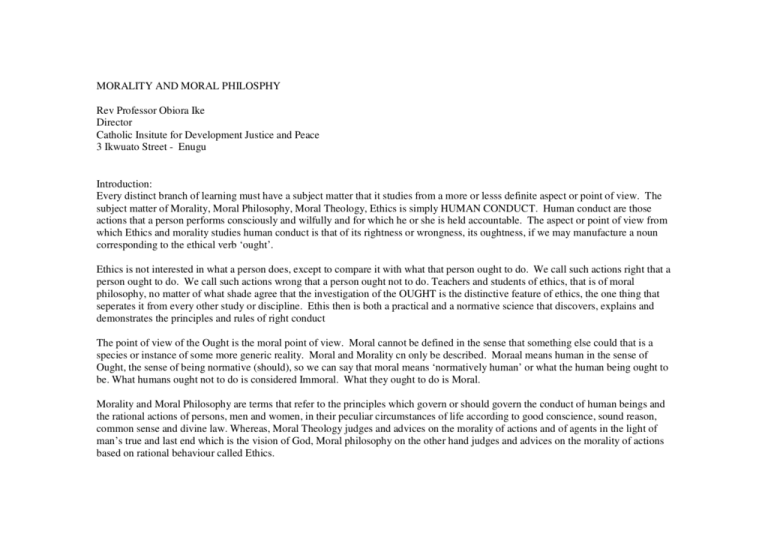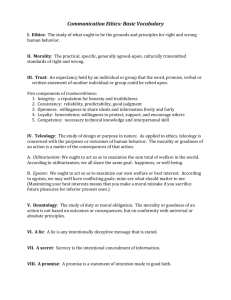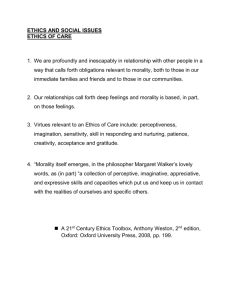Morality and Moral Philosophy
advertisement

MORALITY AND MORAL PHILOSPHY Rev Professor Obiora Ike Director Catholic Insitute for Development Justice and Peace 3 Ikwuato Street - Enugu Introduction: Every distinct branch of learning must have a subject matter that it studies from a more or lesss definite aspect or point of view. The subject matter of Morality, Moral Philosophy, Moral Theology, Ethics is simply HUMAN CONDUCT. Human conduct are those actions that a person performs consciously and wilfully and for which he or she is held accountable. The aspect or point of view from which Ethics and morality studies human conduct is that of its rightness or wrongness, its oughtness, if we may manufacture a noun corresponding to the ethical verb ‘ought’. Ethics is not interested in what a person does, except to compare it with what that person ought to do. We call such actions right that a person ought to do. We call such actions wrong that a person ought not to do. Teachers and students of ethics, that is of moral philosophy, no matter of what shade agree that the investigation of the OUGHT is the distinctive feature of ethics, the one thing that seperates it from every other study or discipline. Ethis then is both a practical and a normative science that discovers, explains and demonstrates the principles and rules of right conduct The point of view of the Ought is the moral point of view. Moral cannot be defined in the sense that something else could that is a species or instance of some more generic reality. Moral and Morality cn only be described. Moraal means human in the sense of Ought, the sense of being normative (should), so we can say that moral means ‘normatively human’ or what the human being ought to be. What humans ought not to do is considered Immoral. What they ought to do is Moral. Morality and Moral Philosophy are terms that refer to the principles which govern or should govern the conduct of human beings and the rational actions of persons, men and women, in their peculiar circumstances of life according to good conscience, sound reason, common sense and divine law. Whereas, Moral Theology judges and advices on the morality of actions and of agents in the light of man’s true and last end which is the vision of God, Moral philosophy on the other hand judges and advices on the morality of actions based on rational behaviour called Ethics. Ethics as the history of Philosophy portrays, has for its purpose, the interpretation of this fact of human life – the acknowledgment of right and wrong in human conduct. This fact that people do make judgments of right and wrong, is the basic fact of experience from which ethics takes its start. The person who does whatever he or she wants, with no regard for what he or she ought, is outlawed from society and hunted down like a wild beast. Philosophy, as an interpretation of human life cannot afford to overlook so widespread an experience but must investigate it and explore all that it involves. If people are correct in distinguishing right from wrong, we need to know why and on what grounds this judgment is justified. We find throughout the human race, a tendency to judge that there are three kinds of acts: - those that a person ought to do those that a person ought not to do those that a person may either do or not do The origin of Ethics Where did ethics come from? Is it a human invention or something we owe to our pre-human ancestors? We need to put aside some myths that still obscures our thinking on these matter; the myth that society is an artificial construct and the myth that nature is red in tooth and claw. Then we can look at what we now know about the social lives of othe animals, especially other mammals, and by this means find clues to the origins of human ethics. Ethics in small – scale societies Early human beings lived in small nomadic groups. Examining the ethical systems of contemporary small- scale socieites, such as the traditional africans, helps us to group the elements of ethical systems suited for societies that live in this manner. Anthropological accoaunts can help us to undersatand why and to what extent some ethical values and principles are universal, or nearly so, among humn beings, while others are subject to wide variations Ancient Ethics and the great Ethical Traditions The earliest surviving documents with an ethical content were written bxy inhabitants of Mesopotamia, some five thousand years ago. They shed light on the initial development of ethics in setttled societies. Other early ethical writings show the nature of ethics in ancient Egypt and in early Hebrew civilisation. There are many ethical traditions to which people living in those areas look to for guidance in their actions. What is distinctive about these traditions? Do they teach what is right? What is the ultimate criterion of right actions? - Indian ethics - Budhist ethics - Classical Chinese ethics - Jewish ethics - Christian ethics - Islamic ethics Western philosphical ethics: The dominant position of western civilisation today means that the western tradition of philosophical thinking about ethics exerts a strong influence on all contemporary discussiions of ethics. We study in this section the following: -Ethics in ancient Greece -Mediaeval and Renaissance ethics -Modern Moral Philosophy How ought I to live? The fundamental practical questins of ethics: What ought I to do? How ought I to live? Make up theories, the more abstract part f which is known as normative ethics. Normative is concerned guiding action towards the right thing to do. We can examine this in the following shools of thought. -Natural Law Natural law teaches that How outhg I to live is in accordance with human nature. -Kantian ethics Kant’s claim that all rational beings ought to obey a ‘catgegorical imperative’ derived from a universal law of reason has been much acclaimed. Do the thing because it is right... -The social contract tradition can morality be thought of as an implicit agreement we make with our fellow human beings in order to gain the benefits of a coopeative social life? This initially atttractive view must face several variatiions on the idae of social contract as it was developed in the 17 th and 18th centuries. -Egoism Egoism tells us to live so as to further our own interests. Psychological egoists think that we all do this anyway, and so it scarcely needs to be advocated. Other philosophical egoists advocate the pursuit of one’s own interest as the rational, and even the ethical way to live. Despite doubts aws to whetehr egoism is properly classified as an ethical theory, it does provide a challenging answer to the fundamental practical questions of how we ought to live. -Contemporary deontology Deontological theories of ethics tell us tha the most important aspects of how we ought to live are goverened by moral rules that ought not to be broken, even when breaking them mijght have better consequences. To assxess such a view we need to unsderstand how the ruels are to be framed and what acts are to count as a breach of them. Exploring these questions leads us to a need to distinguish between intention and foresight, and raises doubts about the coherence of the common notion of obedience to a rule -An ethic of prima - facie duties An ethic of prima-facie duties is bawsed on a distinctive notion of wht it is to have a duty. Prima facie duties may, in particular circumstances yield to other duties. Thus they avgoid some of the harsher conseqnences of a more rigid deonotliogical ethic. But they encounter other objections -Consequentialism Utilitarianism is an example of consequentialist theory. It tells us that we ought always to do whatever has the best consequences. In the case of classicl utilitarianism, ‘best consequences’ is undestood in terms of the greatest possible increase of pleasure over pain; but other theories may share the view that we ought to do what has the best consequences, while dissenting from the classical utilitarian view that pleasure is the sole intrinsic good; and pain the only intrinsic evil. -Utility and the good It is a duty and imposes an obligation to promote good. What things are good in themselves? Utilitariansim suggests that only pleasure is good in iteself. But subsequent versions of utilitarianism have suggested different and perhaps more convincing answers. -Virtue theory Perhaps what I ouight to do is the wrong question to ask. We might ask instead: What kind of person should I be? Virtue theory focuses on this later question and on the virtues that make up good character. -Rights Some hold that a morality can be based on rights. Others regard them as derivativs from a more fundamental moral principle or principles. Whatever the view taken on this question, it is widely thought that at least a partial answer to the question of how we ought to live is given by the injunction to respect the rights of others. -Application of Moral Philosphy and Morality These theories can be applied in the situations of world poverty, environmental rights, euthanasia, abortion, sexual moral questions, personal relationships, equlality, discrimination and preferential treatment, animal care, business ethics, crime and punishment, politica and the problems of dirty hands, war and peace. Other Areas The Nature of Ethics -Realism -Intuitionism -Naturalism -subjectivism -Relativism -universal prescriptivism Conclusion: The debate about morality and agreeable and acceptable rational behaviour continues worldwide. On virtually every item under heaven, there are many opinions. We cannot shy away from the fact that morality and ethical demands accompany us daily in both private life and the public domain. Often, we live quiet private lives that contradict what we stand for in public life. There is a growing demand that peoples private and public life and indeed beliefs are congruos and identical. It is important to conclude that Jesus Christ, the greatest teache+r and moral philospher of all times gave humanity an inujunction that sumarises all that we have tried above to summarise and explicate. Jesus said: Virtue, Ethics and Morality is found fully in the love of God and love of neighbour. The love of God above all things and the love of one’s neighbour as oneself. This according to him, is the fulfilment of the law and the prophets.





